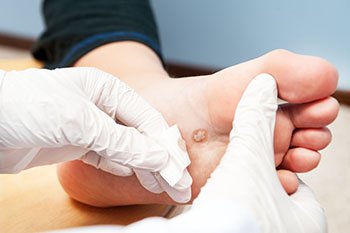How Plantar Warts Appear
Tuesday, 29 June 2021 00:00 Plantar warts are common warts that form on the bottom of the foot as a result of the human papilloma virus, also known as HPV. HPV tends to thrive in warm and moist environments like locker rooms, shower floors and swimming pools. The virus transmits through direct contact and is usually picked up through a small opening in the skin. Once the wart forms, it will appear as a circular flat spot with a depressed center, and it may appear yellow or have a black dot in the middle. Plantar warts can also be very painful. Plantar warts that are causing pain or are spreading should be treated by a podiatrist since there is not a way to tell how deep the wart has grown. Based on the condition of the wart, a podiatrist will be able to determine the best course of treatment for the wart.
Plantar warts are common warts that form on the bottom of the foot as a result of the human papilloma virus, also known as HPV. HPV tends to thrive in warm and moist environments like locker rooms, shower floors and swimming pools. The virus transmits through direct contact and is usually picked up through a small opening in the skin. Once the wart forms, it will appear as a circular flat spot with a depressed center, and it may appear yellow or have a black dot in the middle. Plantar warts can also be very painful. Plantar warts that are causing pain or are spreading should be treated by a podiatrist since there is not a way to tell how deep the wart has grown. Based on the condition of the wart, a podiatrist will be able to determine the best course of treatment for the wart.
Plantar warts can be very uncomfortable. If you need your feet checked, contact Milos Tomich, DPM from Dr. Tomich Foot & Ankle Health Center. Our doctor will assist you with all of your foot and ankle needs.
About Plantar Warts
Plantar warts are the result of HPV, or human papillomavirus, getting into open wounds on the feet. They are mostly found on the heels or balls of the feet.
While plantar warts are generally harmless, those experiencing excessive pain or those suffering from diabetes or a compromised immune system require immediate medical care. Plantar warts are easily diagnosed, usually through scraping off a bit of rough skin or by getting a biopsy.
Symptoms
- Lesions on the bottom of your feet, usually rough and grainy
- Hard or thick callused spots
- Wart seeds, which are small clotted blood vessels that look like little black spots
- Pain, discomfort, or tenderness of your feet when walking or standing
Treatment
- Freezing
- Electric tool removal
- Laser Treatment
- Topical Creams (prescription only)
- Over-the-counter medications
To help prevent developing plantar warts, avoid walking barefoot over abrasive surfaces that can cause cuts or wounds for HPV to get into. Avoiding direct contact with other warts, as well as not picking or rubbing existing warts, can help prevent the further spread of plantar warts. However, if you think you have developed plantar warts, speak to your podiatrist. He or she can diagnose the warts on your feet and recommend the appropriate treatment options.
If you have any questions please feel free to contact one of our offices located in Milwaukee and Wauwatosa, WI . We offer the newest diagnostic and treatment technologies for all your foot and ankle needs.







